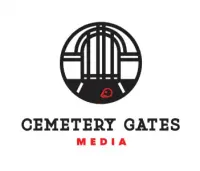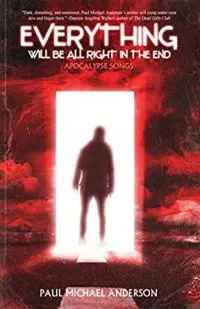What I want to do here is explain how my new collection, Everything Will Be All Right In The End: Apocalypse Songs, was accepted at one house, only for me to walk away from the contract and wind up at Cemetery Gates Media, who published the book on September 6, 2022.
This article is for all the newish writers out there, the ones who haven't yet learned how not to get absolutely fucked when it comes to publishing contracts. I'm going to be as frank and direct as I can. My goal is for you to stop seeing yourself as an amateur compared to the "pros" you follow on Twitter.
Art is an intensely personal experience, tied to the creator's mood and self-worth. It's why you see people react so negatively to bad reviews. So if you are willing to put your art out there, if you think your art is worth something, you have to be able to advocate for it. No one's going to do it for you. No one's going to understand its worth as deeply as you do—not your writer buddies or the Bookstagram folks. They weren't in the room when you wrote it and they sure as shit weren't there when you signed the contract. They encourage, they celebrate, they commiserate, but unless you have an agent, all the nuts-and-bolts stuff is on you.
I used to label myself with the arbitrary term "amateur," and that allowed me to get taken advantage of.
So what were my fuckups?
Well! Early on in my career, I worked with a publishing house that initially bought a few of my stories (for payment in royalties, because I was that green—I never saw a dime of those "royalties"), then asked me to edit two anthologies (only one was credited to me, although I handled the entire damn thing, but I was paid for both), and then a magazine. I'm still owed money, but I'll never see it because the press, thankfully, went under. But, why am I owed money in the first place?
Lesson #1: There are no friends in business
You might be friends with someone outside of the business, but that friendship doesn't exist within a business situation. That was my first big mistake. I never signed a contract to edit a magazine. I had a verbal agreement regarding payment, and trusted my friend to do the right thing. They didn't, but I had no ground to stand on.
I've since worked with many friends in publishing, including the publisher of my first collection, Bones Are Made To Be Broken, but my attitude has changed. I compartmentalize. "We're friends, but here, we're partners, and this document outlines our responsibilities and our roles." The minute you decide something's okay because, hey, the editor or publisher is your friend, that's when you open yourself up to being fucked. Maybe not immediately, and maybe not in that specific situation, but you're opening a door you don't want to open. It's not just about knowing your worth, but advocating for it.
Which brings us to lesson number two.
Lesson #2: Knowing your worth and advocating that worth are two very different things
Everything Will Be All Right In The End was the result of me seeing a few openings, at houses I'd wanted to work with and whose work I'd read, and realizing I'd published enough since Bones Are Made To Be Broken to create a new collection. But, it would be my first time working with publishers I didn't know on friendly-terms. I'm friends with Michael Bailey, who published Bones, and with Max Booth III and Lori Michelle, who published my novella Standalone. The houses I was gunning for here were unknown to me beyond the quality of their output, and that was new territory for me. How would I compose myself with these guys?
Now, if you're looking for me to drop dime on names here, that's not the point of this article. If you follow the lessons, or enough people start advocating for themselves properly, houses will hopefully drop some of the more egregious aspects of their contracts. Anything else is water-cooler gossip.
Anyway, with the house I initially subbed Everything to, I tried to follow Lesson #3 as best I could—
Lesson #3: Research ALL public information on a press when submitting and ask around as much as possible
—even speaking with some authors who'd worked with them in the past. And here, in retrospect, my spidey-sense should've tingled because the info I got, while generally positive, was a bit vague or filled with caveats because my situation was different.
Whoops.
In any event, the book was accepted. They were really excited for the new collection. I was really excited to be working with this house.
And then I saw their standard contract.
Lesson #4: Standard (boilerplate) contracts don't have to be YOUR contract
This isn't about short story, poetry, or article contracts, where the terms are essentially laid out in the guidelines and, if you don't like them, you don't have to pitch or submit. This is about book contracts. Boilerplates set out the initial terms of advances, royalties, copies, and rights that the publisher offers or wants to retain in the course of the business relationship.
 Now, in the Big Bad Pro Publishing World, negotiation of boilerplate contracts occurs between the agent (in coordination with their client) and the publisher, but it's not uncommon for authors to negotiate (for better or worse) for themselves, especially with smaller presses. Also, and this is important, it is not just okay but necessary for you to negotiate and advocate fairly.
Now, in the Big Bad Pro Publishing World, negotiation of boilerplate contracts occurs between the agent (in coordination with their client) and the publisher, but it's not uncommon for authors to negotiate (for better or worse) for themselves, especially with smaller presses. Also, and this is important, it is not just okay but necessary for you to negotiate and advocate fairly.
Too goddamned often, "amateurs" take whatever comes their way because, gee golly gosh, someone is paying attention to them for once. Stop doing that. Yeah, being an artist and excited for attention go hand-in-hand, but, Jesus fuck, let's have some self-respect here. You owe yourself that much.
In my situation, I was a writer who'd cleared his (small) advances for his previous two books and was making royalties off them. I had proven I could make a publishing house money. I was not a Big Known Quantity™, but I wasn't unknown, either, and I had receipts backing up whatever inflated sense of worth I had for my work. Moreover, and this is important with smaller houses, I had also proven that I don't rely on just the publisher doing all the marketing work; I kind of like scheduling interviews and podcasts and pitching articles (hey, how ya doin'?) and chatting about it on social media.
And that’s key—a contract doesn't just outline who gets what, but also, who is supposed to do what. What is the house doing for you besides slapping their logo on your book and uploading it to a POD service? If the answer is "not much," and the contract gives the lion's share of potential profits and rights to the house...that's a problem.
The boilerplate contract I was offered had a number of common strikes against it (and they are generally common; publishing houses are there to make themselves a profit; weird, I know). Those were advance, royalties, a rights grab, and an NDA. I want to discuss each of them—go a bit Publishing 101—before relaying what happened next.
Let's start with advances and royalties. This is the biggest gray area, and where I drift away from concrete absolutes due to their very nature. Certain writers will command big advances or high royalty rates, based on some internal guesswork (it's so far from a science as to be laughable) on the publisher's behalf. Small houses tend to have a stock advance or royalty rate, and that can be fine, too, as long as it's fair to the writer.
For those new to the game, an advance is the amount of money a publisher thinks you can earn and it's set against your royalty rate. So, if your advance is, say, a thousand dollars, your book has to make that amount, at the royalty percentage agreed to, before you start earning any additional "passive income."
The boilerplate advance I was offered was...zero. Moreover, the royalty agreement allowed me, at most, to earn a small fraction of the cover price, dictated by the edition (lowest was hardcover/paperback, highest was with ebooks, but even that was only 25%). Meaning, they were shelling out nothing to put the book out, and they were getting the majority of the profits off my work.
Next, rights. Most writers don't understand them, making them easier to steal, especially in a global market. Many publishers will try to grab rights from their writers—audio, foreign, film and television. It's another way to make money. A contract, ostensibly, is the licensing of rights for that book. Any other format has to have its own terms and conditions. If the house has a strong audio component, it should be spelled out in detail in that contract or a separate one. Same for any other rights. You're negotiating a book, and unless they're a mega-corporation, that's all the house knows how to handle. If they're trying to stake licensing or monetary claims on something that doesn't exist yet, or in a format/media they've never done, they're trying to fleece you. And you're so excited, you don't even notice.
The contract I was offered included royalty agreements for all of those things, at a higher rate than the actual book. That's fine, but other than one of the aforementioned formats, they'd never produced or licensed any of that type of work, as far as I'd been able to find. So, yeah, it's a great rate, but one I'd never see, and 50% of nothing is still nothing. If I signed as-is, I could never option those formats myself, or have an agent do it on my behalf.
Finally, the NDA. When I saw the Non-Disclosure Agreement clause in that contract, I started laughing. I immediately thought of those signs some businesses put up at work telling their employees it's "illegal" to discuss their wages.
I'm going to go a bit Pittsburgh here, but, yinz know that's bullshit, right?
In the boilerplate, both parties were forbidden to publicly disclose the financial terms (i.e. what they wanted to pay me), unless both parties agreed—meaning, I was never going to be allowed to open my mouth because they'd never agree to it. Obviously.
So, that was what was being offered, and it didn't work for me. I countered, advocating for a small advance (based on what I'd been able to earn out before), a higher cut of royalties, striking the extraneous rights, and completely cutting the NDA for the reasons I stated. Not the most modest of asks, but not the most arrogant, and I knew this to be an offer, the first pull in the tug-of-war of negotiations. I understood where the publisher was coming from, and that's fine, but now here was where I was coming from. Let's see if we can meet in the middle.
Except I was told there was no middle because there would be no negotiation. This is what they "generally" offered, I was told, and they would not be making changes just for some guy with two (three, counting a sold-out limited edition of a novella I co-wrote with Bracken MacLeod) small-press books under his belt. Sign or don't, Anderson.
So, I didn't. Bands didn't strike up to play, eagles didn't soar overhead. I just walked away, thanking them for their time, but eternally grateful I wasn't so enraptured by any one house, or seeing my name in print, that I would allow something like the terms of that contract.
Lesson #5: Don't be afraid to walk away if you know your worth
 Vaguely disillusioned after peaking behind the curtain of the initial publisher, I put a few feelers out there. Nothing serious, but I didn't put the collection completely aside. It wasn't part of some grand plan on my part, even though I'd realized I actually had something to say with that assortment of stories (if you want to know what, you'll have to buy the book). So I pushed, but not that hard; I had other stories to write.
Vaguely disillusioned after peaking behind the curtain of the initial publisher, I put a few feelers out there. Nothing serious, but I didn't put the collection completely aside. It wasn't part of some grand plan on my part, even though I'd realized I actually had something to say with that assortment of stories (if you want to know what, you'll have to buy the book). So I pushed, but not that hard; I had other stories to write.
At some point, I discovered Cemetery Gates Media was open. They spelled a lot of their rates for longer works right out in public, like you see for short story calls, and I liked that. They were also working with writers I had heard of, and seemed to be operating above board, and I liked that, too. Their opening only mentioned novels and novellas, not collections, but, knowing I had nothing to lose, I reached out to see if they had any interest.
The funny thing was, while they weren't opposed to collections, they weren't initially interested in my collection. They explained that, as a newer house, they really wanted to cultivate their own brand, built with the writers they'd already done business with. I was as much of an unknown quantity to them as vice versa. We'd heard about each other on social media. That's about it.
I completely understood, slid the manuscript across the digital desk, and said, hey, check it out just as a pleasure read, and maybe we'll work together on something else, someday. I wasn't being coy here. At best, I was networking, building relationships, thinking they might have a call I could write something for. CGM was straight up with me, and I appreciated it and responded in kind. Afterwards, I promptly forgot about it while I worked on other things.
I forgot, in fact, for over a month, right up until the moment CGM emailed me with the quick message, "Actually, we really like this. We want it."
And their contract, the terms of which I was already familiar with, was quite nice for both parties. I honestly had nothing to negotiate, which might seem a bit anticlimactic after walking you through the first contract, but they were fair and straight up with me, offering me something I was comfortable with at this moment in my career.
So, what's the takeaway?
You're going to be taken advantage of if you don't value your work and don't advocate for that value. Moreover, none of that means anything if you're not willing to walk away if someone is not playing straight with you.
Anyway, go pick up Everything Will Be All Right In The End: Apocalypse Songs, so Cemetery Gates Media won't feel like they wasted their money and hardwork, and all those writers who blurbed the book don't seem like liars.
Get Everything Will Be All Right In The End: Apocalypse Songs at Amazon

About the author
Paul Michael Anderson is the author of the collections BONES ARE MADE TO BE BROKEN and EVERYTHING WILL BE ALL RIGHT IN THE END, as well as the novellas YOU CAN'T SAVE WHAT ISN'T THERE, STANDALONE, and HOW WE BROKE (with Bracken MacLeod). He currently lives in Virginia.








